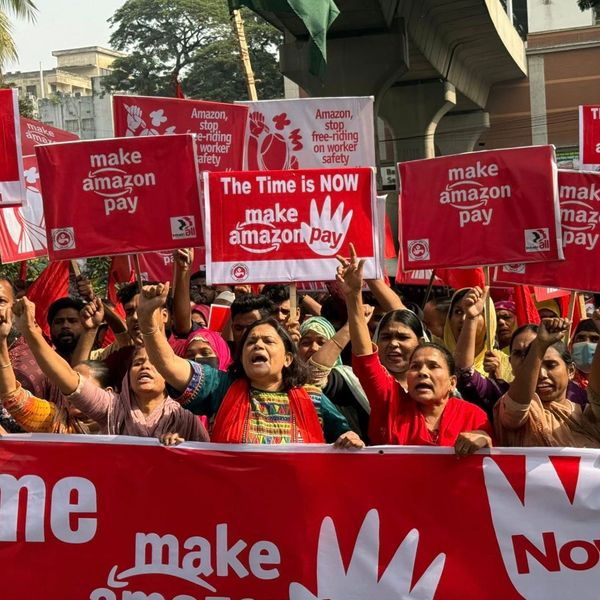Last week, the business press reported Amazon.com had record third-quarter profits as its stock price approached dot.com bubble peaks. We should all be joining in the celebration of Amazon's success because, as taxpayers, we deserve most of the credit.
The business press has written numerous stories explaining how Jeff Bezos, Amazon's founder and CEO, is a truly brilliant businessman. This may well be true, but the secret of his success is not in the futuristic world of the Internet, rather it's in the old-fashioned world of tax avoidance. The key to Amazon's profits is its customers do not have to pay sales taxes on their purchases. In effect, Amazon has been allowed to set itself up as a virtual tax-free shopping zone.
The point here is simple: if someone goes to their neighborhood book store, clothes store, toy store, or even Wal-Mart (Amazon sells just about everything these days), they generally have to pay sales tax on whatever they buy. In some states, the sales tax can be higher than 8 percent, costing a family $16 or more on a $200 purchase
But not at Amazon: operating in the 21st century Internet, Amazon shoppers can purchase their products without paying state sales tax (unless you are unlucky enough to live in one of the four states where Amazon has a physical presence). As a result of a loophole in the law, Amazon is not required to collect sales tax on its sales. Amazon effectively splits this tax bonanza with its customers, giving them an incentive to keep coming back.
To see how important the tax subsidy is, Amazon earned just under $400 million in profits last year, which is approximately equal to 3 percent of its $13 billion in sales. If we assume an average state sales tax of 4 percent on purchases, Amazon's tax subsidy exceeded Amazon's profits.
While Amazon and its customers can both be happy about this situation, this is not a classic win-win story. The sales diverted to Amazon and other Internet retailers came at the expense of old-fashioned brick and mortar retailers who haven't mastered the 21st century skill of tax avoidance. These old-timers are losing business and profits because of Amazon's tax subsidy.
State and local governments are also losing tax revenue. This means these governments must either cut back services provided to their residents or they must raise other taxes. Of course buying goods over the Internet does not reduce the demand for services from state and local governments. So, when politicians promise not to tax the Internet they are in effect promising to have higher taxes on items other than Internet purchases.
The fact that so many politicians are so anxious to pledge to raise taxes on non-Internet purchases probably reflects the fact Internet shoppers tend to be relatively more affluent and, therefore, more likely to contribute money to political campaigns than people who don't shop on the Internet. Candidates are always happy to help such people with a few bucks off their Internet purchases, even if it means the people who shop at Wal-Mart pay more.
Amazon and other Internet retailers also feature prominently in this story. They have not been shy about using their political power to ensure their tax subsidy remains in place as long as possible.
At the moment, there is little political momentum to take away Amazon's tax subsidy. The businesses that suffer from the subsidized competition are either too disorganized to do much, or have more pressing problems to deal with, such as paying for health care for their workers. The general public has been kept largely uninformed on the issue because the news media generally opt not to report on subsidies to major businesses and relatively affluent customers.
So, if you can get to the web to do your shopping, you should appreciate the fact you don't have to pay sales tax like Wal-Mart shoppers. And, you should take pride your tax subsidies have allowed Amazon to be a major international retailer. Jeff Bezos couldn't have done it without us.
Dean Baker is the co-director of the Center for Economic and Policy Research (CEPR). He is the author of The Conservative Nanny State: How the Wealthy Use the Government to Stay Rich and Get Richer ( www.conservativenannystate.org). He also has a blog, "Beat the Press," where he discusses the media's coverage of economic issues. You can find it at the American Prospect's web site.


